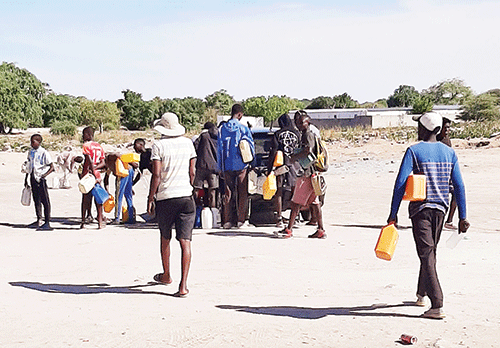Residents from the northern regions are increasingly alarmed by a surge in violent attacks attributed to Angolan fuel smugglers operating in the informal market known as “Ngungula”.
Victims report being stabbed, assaulted and robbed of money, cell phones, and other valuables immediately after purchasing cheaper, smuggled fuel.
Ngungula, a colloquial term for fuel illegally imported from Angola, has become a popular option due to its lower prices compared to official Namibian service station rates.
The practice has persisted despite efforts by law enforcement to curb it.
However, this unregulated trade has attracted criminal elements, leading to a spike in violent incidents.
Sammy (not real name), a taxi driver from Oshakati, recounted a harrowing experience.
“I went to Ngungula to save on fuel costs, but instead, I was attacked by men wielding knives and hacked me with a panga on my arm. They took everything, my wallet, phone and even threatened my life,” he narrated.
He said they all ran into Angola, and left him bleeding.
Thomas (not his real name) from Ongwediva, described the situation as tough.
“If we continue fuelling in the bush, we will lose our lives soon, those people have no mercy,” he said.
Thomas said he can’t recall how his phone was taken from him; all he remembers is smugglers with knives in their hands surrounding him.
A local street vendor, who requested anonymity due to safety concerns, described witnessing a group of smugglers approaching the unsuspecting driver.
“They surrounded his vehicle, brandishing knives and pangas, the man tried to resist, but they overpowered him, taking his money and cell phone before fleeing back across the border,” the vendor recounted.
She said such occurrences are becoming increasingly common, with smugglers employing violence to protect their lucrative operations.
A five-litre container of petrol or diesel, which would cost N$530 at local service stations, is sold for N$60 in João Lourenço’s land.
A 25-litre container goes for as little as N$250 from Angola.
Those who purchase the fuel for profit then resell the 25-litre container for between N$400 and N$450, making a profit of N$100 to N$150.
The Namibian Police have acknowledged the challenges in curbing these illegal activities.
Ohangwena Commissioner Ottilie Kashuupulwa, noted that Angolan fuel smugglers at Oshikango have become increasingly aggressive towards Namibians who illegally fuel at the borders.
“We are fully aware of the situation, we know they are being attacked and robbed, but what can we do? They do not report such incidences to the police because they know what they are doing is wrong,” she stated.
Kashuupulwa advised Namibians to refrain from illegal activities, advising that if they want petrol, they must go inside Angola and fuel at legal filling stations.
-vkaapanda@nepc.com.na


